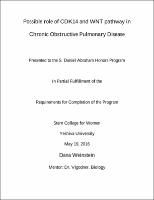Please use this identifier to cite or link to this item:
https://hdl.handle.net/20.500.12202/4046| Title: | Possible role of CDK14 and WNT pathway in Chronic Obstructive Pulmonary Disease |
| Authors: | Dana, Weinstein |
| Keywords: | Lungs --Diseases, Obstructive. Diseases --Causes and theories of causation. Smoking --Health aspects. Environmentally induced diseases. |
| Issue Date: | 2016 |
| Publisher: | Stern College for Women |
| Abstract: | igarette smoking is the major risk factor for the development of devastating and poorly reversible lung disorders such as Chronic obstructive pulmonary disease (COPD). COPD pathogenesis is poorly understood and the available treatments are symptomatic but not curative. Therapies aiming to reduce inflammation or oxidative stress have only had a limited success thus far, resulting in an emerging need to better understand and target molecular and cellular events leading to COPD progression. One feasible approach is to activate pathways important for lung repair and regeneration thus attenuating the lung tissue loss that leads to emphysema. Of yet, known "developmental" signaling, such as the WNT pathway, have drawn much attention in the COPD field. The WNT pathway is required for stem cell proliferation, differentiation during lung development and for damage-induced repair of the adult lung tissue. CDK14 kinase (cyclin-dependent kinase 14, also known as PFTK1, a novel member of the CDC2-like kinase family) has recently been implicated in regulation of the WNT pathway. CDK14 was recently identified by Vigodner's group as a gene that was significantly down-regulated by tobacco exposure in vivo. and in vitro. Furthermore, CDK14 expression was mostly observed in proliferative progenitor cells implicated in WNT signaling. Treatment of lung epithelium- Possible role of CDK14 and WNT pathway in Chronic Obstructive Pulmonary Disease 4 derived cell lines with cigarette smoke extract (CSE) at the concentrations of 1- 10% (corresponding to the nicotine concentrations similar to these measured in the blood of the smokers resulted in significant down-regulation of CDK14mRNA and protein levels in all cell lines. Therefore, tobacco induced down-regulation of CDK14 may have a role in reduced proliferation of lung epithelium and progression of COPD. The aim of this study was to examine and correlate the levels of CDK14, and other WNT activity markers in multiple human COPD/emphysema samples from different progressive stages of the disease as compared to normal lung tissues. DNA microarray gene expression data were received from Lung Tissue Research Consortium (LTRC). The data was provided for the following three group of COPD patients based on Forced expiratory volume (FEV) parameters: Group 1) FEV1 is > 80% (normal); Group 2) FEV1 is 50-80% (moderate disease); Group 3) FEV1 is < 50% (severe/progressed disease). Using bioinformatics analysis, our study found that CDK14, along with other genes related to the WNT/ß-catenin pathway, such as AXIN1, AXIN2 and ßcatenin genes, showed a significant decrease in gene expression in patients with severe COPD, as compared to a control. These data suggest that CDK14 may have a role in progression of COPD. While there was a decreased trend in CDK14 level in the moderate group as compared to the control, the difference was not Possible role of CDK14 and WNT pathway in Chronic Obstructive Pulmonary Disease 5 statistically significant. Since this study only examined gene expression in whole lung tissue samples, further studies using isolated alveolar epithelium cells is necessary to determine the precise role that CDK14 plays in the WNT/ß-catenin pathway and in initiation and progression of COPD. |
| Description: | The file is restricted for YU community access only. |
| URI: | https://hdl.handle.net/20.500.12202/4046 https://ezproxy.yu.edu/login?url=https://repository.yu.edu/handle/20.500.12202/4046 |
| Appears in Collections: | S. Daniel Abraham Honors Student Theses |
Files in This Item:
| File | Description | Size | Format | |
|---|---|---|---|---|
| Dana-Weinstein.pdf Restricted Access | 622.46 kB | Adobe PDF |  View/Open |
This item is licensed under a Creative Commons License

